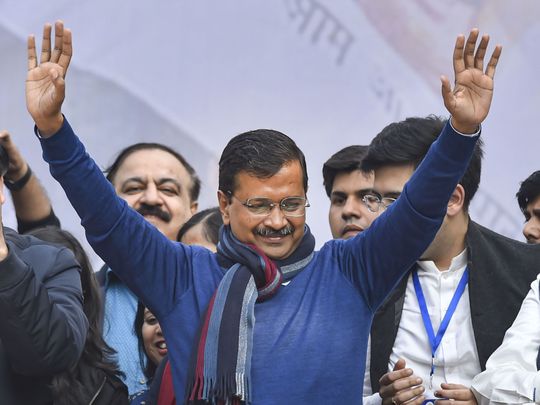
The stunning results of the Delhi state assembly elections have sent Indian opposition parties into an overdrive of celebrations, predicting the imminent defeat of the ruling Bharatiya Janata Party (BJP) in future elections in key states such as Bihar, West Bengal, Tamil Nadu and Assam. That assessment is based on Chief Minister Arvind Kejriwal comprehensively securing a third term in the Delhi Legislative Assembly, with his Aam Aadmi Party (AAP) winning 62 out of 70 seats. Prime Minister Narendra Modi’s BJP could only manage to wrestle 8 seats despite a blistering high-voltage campaign that often devolved into hate-filled propaganda.
The result has certainly boosted the morale of the mostly fragmented and lacklustre opposition parties in India — especially because this is the third straight electoral loss in state assemblies for the BJP since Modi was re-elected with a landslide in 2019.
Yet, the Opposition euphoria might be short-lived.
It’s time for the BJP and Modi to renew their focus on delivering on those promises and win back the confidence of global investors and the Indian voter.
It’s been proved in successive national elections that the priorities of the average Indian voter are very different when it comes to provincial or state elections — where they focus on grassroots issues such as efficient local governance, women’s safety, civic infrastructure development and delivery of education and health care needs. It’s thus no wonder that thousands of Delhi residents who voted for Modi a few months back in national elections have embraced Kejriwal once again to deliver for the Indian capital. But, whether the same results will be repeated in future state elections, or even at the national level in 2024, is not clear.
What’s abundantly clear with the Delhi verdict is that the Indian voter has soundly rejected the chest-thumping vitriol of the BJP campaign, in which Hindu-nationalist lawmakers and ministers exhorted their supporters to “shoot the traitors” and called Kejriwal a terrorist.
Referendum on Modi, Hindu nationalism and sectarian identity
Indeed, Indian Home Minister Amit Shah turned the Delhi election into a referendum on Modi, Hindu nationalism and sectarian identity — doubling down on a religion-based citizenship law and scorning its opponents as “agents of Pakistan”. The BJP’s defeat, therefore, should be a sobering moment for the party and a timely reminder for Modi, who won unprecedented mandates in 2014 and 2019 on promises of radical reforms to spur economic growth, corruption-free governance and inclusive development for all.
With unemployment in India at a 45-year high and the economy struggling to pick up pace, it’s time for the BJP and Modi to renew their focus on delivering on those promises and win back the confidence of global investors and the Indian voter, rather than indulging in divisive politics and fanning sectarian hatred.







